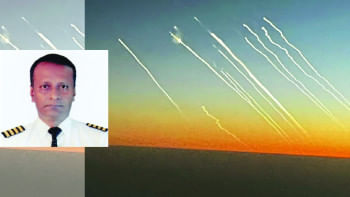Warm welcome to PM Modi
Indian Prime Minister Narendra Modi embarks today on his august visit to Bangladesh, 'with a sense of enthusiasm and delight', to borrow his own words. A hospitable Bangladesh is ready to reciprocate his spirits with a very warm welcome. But expectations are running very high in Dhaka, and quite naturally so.
The heightened sense of expectancy in Bangladesh can be attributed to two contrasting reasons: first, the dashed hopes during Manmohan Singh's premiership when in 2011 the stage looked all but set in Dhaka for tangible breakthrough on Teesta accord and LBA. But that was not to be, and we all know the reasons why. Our disappointment was enormous. Secondly, in contrast, with Modi as prime minister on a massive mandate could inject a fresh dynamic into consensus-building process which started yielding results commensurately raising the level of expectations in Bangladesh.
Modi didn't want to come to Bangladesh empty-handed; and so he hasn't, with LBA signed, sealed and dusted having been delivered 41 years since Dhaka had ratified it. Now the expectations surround the still elusive Teesta water sharing accord. Mamata is here accompanying part of Modi's visit so that a firm signal of a definitive time-line assigned to the solution of the issue can be given to Bangladesh to allay its concern over Teesta waters.
Modi being a man of action and vision raises the hopes across the board for balanced and equitable relations at the bilateral, subregional and regional levels.
Notably, a plethora of new deals will be signed on coastal shipping including cooperation between two coastal guard squads, new bus services improving connectivity, cooperation between BSTI and Indian Standards Institute for certifying products manufactured in Bangladesh, prevention of human trafficking, cooperation on sea based Blue Economy, among others. These are indicative of the seriousness that Modi government is showing in giving practical dimensions to our bilateral relationships.

 For all latest news, follow The Daily Star's Google News channel.
For all latest news, follow The Daily Star's Google News channel. 



Comments